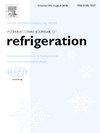利用综合二氧化碳制冷系统提高挪威乳制品的热能效率:性能数据和能源效率改进的可能性
IF 3.8
2区 工程技术
Q1 ENGINEERING, MECHANICAL
International Journal of Refrigeration-revue Internationale Du Froid
Pub Date : 2025-10-02
DOI:10.1016/j.ijrefrig.2025.10.001
引用次数: 0
摘要
由于在不同温度水平下对热能的高需求,奶牛场被认为是非常能源密集型的。本研究调查了挪威中部最大的有机乳制品的热能需求,该乳制品利用完全集成的二氧化碳制冷系统来覆盖其冷却和热水需求,以及用于巴氏消毒,灭菌和就地清洁(CIP)的电蒸汽锅炉。每月分析2024年的特定能量流,并创建热需求分布图。制冷机的比能耗在27.5 Wh/l至43.0 Wh/l之间,热水供暖的比能耗在34.3 Wh/l至48.4 Wh/l之间。2024年,电蒸汽锅炉占该厂用电量的36.4%。因此,该研究旨在提供乳制品(热)能源消耗的真实世界数据,从而为进一步的系统开发奠定基础,这在本文中是概念化的。本文章由计算机程序翻译,如有差异,请以英文原文为准。
Improving thermal energy efficiency in a Norwegian dairy utilising integrated CO2 refrigeration systems: performance data and energy efficiency improvement possibilities
Dairies are considered very energy intensive due to the high demand for thermal energy at different temperature levels. This study investigates the thermal energy demand of the largest organic dairy in central Norway, which utilises a fully integrated CO2 refrigeration system to cover their cooling and hot water demand and an electric steam boiler for pasteurisation, sterilisation and cleaning in place (CIP). The specific energy flows of 2024 were analysed monthly and thermal demand profiles created. The specific energy consumptions were found to be between 27.5 Wh/l to 43.0 Wh/l for cooling and 34.3 Wh/l and 48.4 Wh/l for hot water heating. The electric steam boiler accounted for 36.4% of the plant’s electricity consumption in 2024. Therewith, the study aims to present real world data of the (thermal) energy consumption of a dairy and thereby lay ground for further system developments, which are conceptualised in this paper.
求助全文
通过发布文献求助,成功后即可免费获取论文全文。
去求助
来源期刊
CiteScore
7.30
自引率
12.80%
发文量
363
审稿时长
3.7 months
期刊介绍:
The International Journal of Refrigeration is published for the International Institute of Refrigeration (IIR) by Elsevier. It is essential reading for all those wishing to keep abreast of research and industrial news in refrigeration, air conditioning and associated fields. This is particularly important in these times of rapid introduction of alternative refrigerants and the emergence of new technology. The journal has published special issues on alternative refrigerants and novel topics in the field of boiling, condensation, heat pumps, food refrigeration, carbon dioxide, ammonia, hydrocarbons, magnetic refrigeration at room temperature, sorptive cooling, phase change materials and slurries, ejector technology, compressors, and solar cooling.
As well as original research papers the International Journal of Refrigeration also includes review articles, papers presented at IIR conferences, short reports and letters describing preliminary results and experimental details, and letters to the Editor on recent areas of discussion and controversy. Other features include forthcoming events, conference reports and book reviews.
Papers are published in either English or French with the IIR news section in both languages.

 求助内容:
求助内容: 应助结果提醒方式:
应助结果提醒方式:


